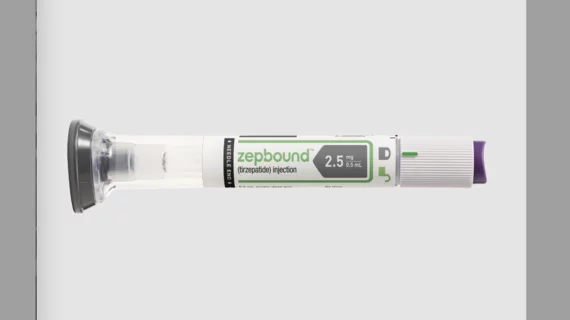Diabetes drug resolves sleep apnea in up to 52% of patients—is FDA approval in the cards?
The diabetes drug tirzepatide is associated with significant benefits for obese patients with obstructive sleep apnea (OSA), according to new research presented at the American Diabetes Association’s 2024 Scientific Sessions and published in the New England Journal of Medicine.[1]
Tirzepatide is sold by Eli Lilly and Company under the brand names Zepbound and Mounjaro. It was originally approved by the U.S. Food and Drug Administration (FDA) for the treatment of type 1 diabetes in 2022. In 2023, it gained an additional FDA approval for chronic weight management in adult patients who are obese, overweight or present with at least one weight-related condition such as high blood pressure or high cholesterol.
Lilly announced results from two separate studies focused on the potential relationship between tirzepatide and OSA. The SURMOUNT-OSA clinical trials included data from more than 450 patients who, after a four-week screening period, were randomized to receive either tirzepatide once per week or a placebo for 52 weeks. All patients were diagnosed with moderate-to-severe OSA and obesity.
Overall, the studies revealed that treatment with tirzepatide was linked to a mean reduction of up to 62.8% on the apnea-hypopnea index (AHI) compared to a placebo. That number represents approximately 30 fewer events per hour of sleep. In addition, the first study found that tirzepatide helped 43% of patients achieve disease resolution; the second study estimated disease resolution to be 51.5%.
A majority of participants were male and white in both trials. The mean participant ages were 48 and 52 years old. The mean body mass index was 39.1 for one trial and 38.7 for the other.
In both trials, adverse event rates were more common in the tirzepatide group than in the placebo group. The most commonly reported adverse events were gastrointestinal in nature; they were generally mild-to-moderate in severity.
On the other hand serious adverse events rates were comparable between the tirzepatide group and the placebo group. No deaths were reported in either trial.
“OSA can be very disruptive to daily life and affects a person's long-term health when left untreated because it can lead to serious cardiometabolic complications,” first author Atul Malhotra, MD, professor of medicine at University of California San Diego School of Medicine and director of sleep medicine at UC San Diego Health, said in a prepared statement. “These data support the efficacy of tirzepatide in adults living with moderate-to-severe OSA and obesity and has the potential to add to our toolbox for OSA treatment.”
Based on these positive results, Lilly has said it is now actively working toward securing FDA approval for tirzepatide as an OSA medication in addition to its existing indications. The company previously received the agency’s fast track designation for treating moderate-to-severe OSA in obese patients.
Click here to read the studies in full.

